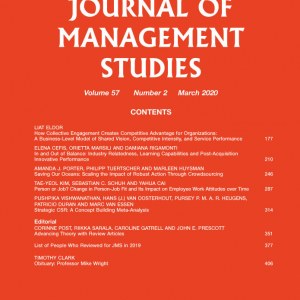
Boone, C., De Brabander, B. and Van Witteloostuijn, A. (1996). CEO locus of control and small firm performance: An integrative framework and empirical test Journal of Management Studies, 33(5):667--699.
-
Affiliated author
-
Publication year1996
-
JournalJournal of Management Studies
Previous research on the impact of chief executive officer (CEO) locus of control is mainly based on simple and partial mappings of bivariate associations between CEO locus of control and organizational outcomes. In addition, distinct substreams have emerged in which intricately related phenomena are studied separately. To overcome this fragmentation and polarization, we provide and empirically test an integrative framework based on previously tested hypotheses on the impact of CEO locus of control. Our approach differs from prior research in two ways. First, it simultaneously takes account of strategic choice and firm performance in order to assess the extent to which strategy mediates the relationship between CEO locus of control and organizational performance. Second, we consider the CEO to be both a formulator and implementor of organizational strategies. Besides the observation that CEO locus of control seems to matter a lot in terms of explaining organizational performance in the present sample, our results demonstrate that an integrative approach increases our insight into the impact of CEO locus of control by revealing why some CEOs achieve higher organizational performance than others.